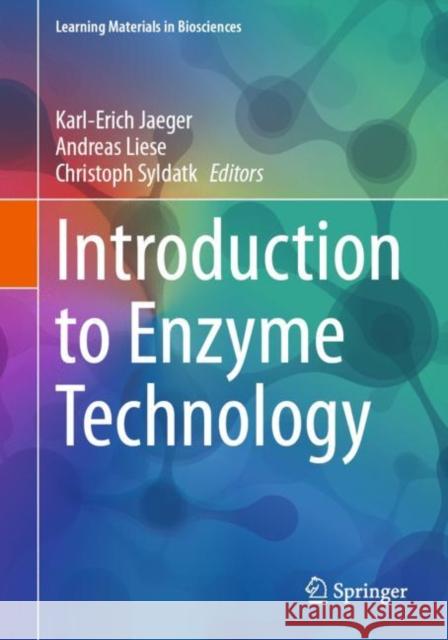Introduction to Enzyme Technology » książka



Introduction to Enzyme Technology
ISBN-13: 9783031429989 / Angielski
Introduction to Enzyme Technology
ISBN-13: 9783031429989 / Angielski
(netto: 327,38 VAT: 5%)
Najniższa cena z 30 dni: 327,68
ok. 16-18 dni roboczych.
Darmowa dostawa!
Enzyme Technology II, Univ.-Prof. dr Karl-Erich Jaeger, Univ.-Prof. dr Jörg Pietruszka, Achim Heck, Filip Kovacic, Dr. Sonja Meyer zu Berstenhorst, Andrea Jeanette Weiler, Dr. Thomas Classen, Tim Moritz Weber. University of Düsseldorf, Germany
Research Seminar "Molecular Enzyme Technology", Univ.-Prof. dr Karl Erich Jaeger, University of Düsseldorf, Germany.
Fundamentals of Bioprocess Engineering, Technical Biocatalysis, Biocatalysis and Enzyme Technology and advanced study topics, Prof. Dr. Andreas LIese, Institute of Technical Biocatalysis, Technical University of Hamburg, Germany.
Karlsruhe Institute of Technology (KIT), Institute of Engineering in Life Sciences, GermanyUniversity Bochum, Germany. From 1988–1989, he worked as a postdoc with Prof. Dr. Robert E.W. Hancock at the Department of Microbiology, University of British Columbia, Vancouver, B.C., Canada. In 2002, he declined a call as Head of the Institute of Microbiology at University of Stuttgart, Germany and accepted the position of a full professor at Heinrich Heine University Düsseldorf and director of the Institute of Molecular Enzyme Technology at Forschungszentrum Jülich, Germany. In 2013, he was additionally appointed as director at the Institute of Bio- und Geosciences IBG-1: Biotechnology of the Forschungszentrum Jülich GmbH which belongs to the German Helmholtz Association. Karl-Erich Jaeger is co-founder of the biotech company evocatal GmbH (now evoxx technologies) and served as chairman of the supervisory board from 2007 to 2017. He has published more than 250 peer reviewed research papers and 17 patent applications; is an editorial board member of several scientific journals and serves as vice-president of the Cluster of Industrial Biotechnology – CLIB. His research interests are focused on bacterial enzymes and fluorescent proteins, their identification, biochemical and structural characterization and biotechnological applications.
Prof. Dr. Andreas Liese studied chemistry and carried out his doctoral research at the Research Center Jülich, Germany. He received his Ph.D. from the University of Bonn in 1998. From 1998 to 2003, Liese was assistant professor at the University of Bonn and at the same time head of the Enzyme Group at the Institute of Biotechnology II (Prof. Dr. C. Wandrey) within the Research Center Jülich. After a sabbatical in 2000 at Pfizer Global Research & Development, San Diego, USA, he worked as an associate professor at the University of Münster from 2003 to 2004. In 2004 he was appointed as full professor for Technical Biocatalysis 2004 at the Hamburg University of Technology (TUHH), Germany, as the director of the Institute of Technical Biocatalysis . He is an elected member of the German Academy of Engineering Sciences – acatech. His research focuses on fundamental and applied aspects of technical biocatalysis, including process-analytical technologies, multiphase systems, chemo- and electroenzymatic reaction sequences and environmental biotechnology. He and his team are unifying these concepts with the development of technologies to establish smart reactors. In addition, his team is active in STEM (Science, Technology, Engineering and Mathematics) motivation/education of pupils with various programs.
Prof. Dr. Christoph Syldatk studied biology at the Technical University (TU) of Braunschweig/Germany. After receiving his Ph.D. in 1984 he became assistant professor at the Institute of Biochemistry and Biotechnology and head of the newly formed research group "Regio- and Stereoselective Bioconversions". In 1990 he received his Venia Legendi for Biochemistry and Biotechnology and worked as a lecturer at the Institute of Biochemistry and Biotechnology of the TU Braunschweig/Germany from 1991 - 1993 funded by a Heisenberg scholarship of the German Research Foundation (DFG). In 1993, he became full professor at the Institute of Biochemical Engineering of the University of Stuttgart/Germany and in 2003, he accepted a call to become full professor for Technical Biology at the Institute of Process Engineering in Life Sciences at the Karlsruhe Institute of Technology (KIT). For many years, Prof. Syldatk has been an active member of the DECHEMA (Society for Chemical Engineering and Biotechnology) and the VAAM (Association for General and Applied Microbiology). His main research interests are in industrial microbiology, enzyme technology, production of biosurfactants, unusual enantiopure amino acids and single cell oils. Prof. Syldatk is author and coauthor of more than 200 peer reviewed publications and 20 patent applications. Since April 2023, Prof. Syldatk is an active retired Professor at KIT.
This interdisciplinary textbook provides an easy-to-understand and highly topical introduction to all the specialist areas of modern enzyme technology.
In the first part of this three-part textbook, the reader is introduced to the fundamentals of enzyme structure, reaction mechanisms, enzyme kinetics, enzyme modeling, and process control. In the second part, methods for finding, expressing, optimizing, purifying, immobilizing, and using enzymes in unusual reaction media are presented. In the third part, leading experts use examples to describe current applications of enzymes in the chemical and pharmaceutical industries, for biomass degradation, food production and processing, as additives in detergents and cleaning agents, for constructing biosensors, and as therapeutics.
Students of bachelor and master programs in biology, chemistry, biochemistry, and bioprocess engineering will gain up-to-date access to practical applications and developing industries. However, the fluent writing style makes the work suitable for all readers, who want to gain an easy-to-understand insight into the production and application of enzymes.
This book is a translation of an original German edition. The translation was done with the help of artificial intelligence (machine translation by the service DeepL.com). A subsequent human revision was done primarily in terms of content, so that the book will read stylistically differently from a conventional translation.1997-2026 DolnySlask.com Agencja Internetowa
KrainaKsiazek.PL - Księgarnia Internetowa









